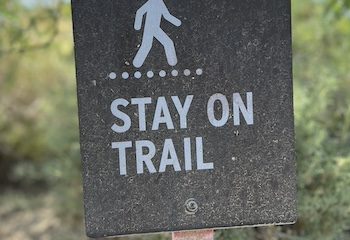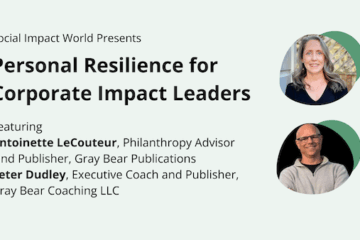Build your resilience with these three simple tips
We all have setbacks. We all get knocked down or rejected from time to time. It’s part of life.
That’s why building resilience is important.
resilience
1 : the capability of a strained body to recover its size and shape after deformation caused especially by compressive stress
2 : an ability to recover from or adjust easily to misfortune or change
– Merriam-Webster dictionary
Companies try to build resilience to make it through and past a market crash. Communities work on resilience to survive and recover from disasters. Strong infrastructure and adaptability go a long way to persevering through adversity so you can quickly and reliably rebuild.
The same is true for people, yet we tend not to proactively work on our resilience. We just shrug and say, “Wow, that person is so great at overcoming adversity. I wish I were like that.”
It’s natural to focus on everything but resilience
People don’t save as much as we should. We stay up too late watching one more episode. We order the fries even when the side salad is the same price. We read about disaster preparedness but never find time to actually create a preparedness kit.

Humans are very good at choosing our current self over our future self. It turns out we’re hard-wired to do so because in our minds, our future self is actually some other person.
Heart disease? I don’t have it; that’s Future Peter’s problem. Rising sea levels? That’s not a problem for residents of Florida. It’s only a problem for residents of Future Florida.
It’s human nature to focus on the problems we have today rather than the hypothetical problems some other future person might have. Even if that future person is future us.
This is actually the reason that building resilience is so important. If you have a strong infrastructure and an ability to adapt, Future You will be more able to handle whatever you set them up for.
So, how do you build that resilience as part of who you are? How do you create and maintain a strong personal infrastructure and add adaptability to your personality?
Don’t worry—I’m not going to demand that you exercise every day or set aside savings or create a disaster kit or make sure your apocalypse bunker is well stocked with seeds and ammo. Those may be part of a strong infrastructure that can help you through certain types of setbacks, but they’re also not things that everyone is able do.
If you’re already working 52 hours a week and barely able to pay your bills, you’re not going to have much capacity to join a gym and start saving for the future.
Three ways to build your resilience
The three tips below are things anyone can do. All it takes is the will to do them. I’ve seen them be effective time and time and time again over my 30+ year career.
1. Make honest self-reflection a daily practice
Resilience is built during the easy times and relied on during the hard times. Adversity doesn’t build resilience… adversity reveals resilience.
That’s why honest self-reflection needs to be a daily practice all the time, especially when everything seems just… normal.
Each day, set aside some time—just a couple minutes will do—to reflect on what you accomplished that day and what you struggled with.
Write it down. In a journal, in the Notes app on your phone, on sticky notes. Write it wherever it’s easy and convenient for you. Don’t make a big production of it.

Cataloging your achievements and struggles in this way builds your awareness of your own capabilities and strengths. You may think you know all this naturally, but it turns out that people are terrible at knowing actual facts about themselves.
We tend to believe what our own biases tell us about ourselves, and we tend to believe what others say about us. Writing down daily facts and reflections gives you the opportunity to capture real-time data about your own performance. Without the data, there’s no way to confirm or refute what you “know” about yourself.
Self-awareness builds confidence and reduces fear. By knowing what you’re good at and where you need help, you can be quicker and more adaptable in your problem-solving when something bad happens, and more capable of rebuilding afterwards.
2. Approach life with humor and gratitude instead of judgment and fear
Negativity tends to be self-fulfilling. So does positivity. I don’t have data to back that up; it’s a conclusion I’ve reached after working with and observing hundreds of people in many capacities over 50 years.
If you are perpetually negative, the daily reflections I told you to do in tip 1 above may turn into unhealthy rumination, as they did for me. To quote the Indigo Girls, darkness has a hunger that’s insatiable. If, however, you are toxically positive, you may get stuck in magical thinking. Lightness’ call is not actually that hard to hear for many of us.
Anyway, let’s not focus on positivity versus negativity, or optimist versus pessimist. That kind of language just serves to label and shame people.
Instead, let’s focus on behaviors.

The people I’ve known who have very little resilience are people who approach every situation with judgment and fear. They find fault with everyone else. They are afraid of losing what they have. They fear the unpredictable and the unknowable. So when trouble hits, they often panic and make bad decisions, often out of fear. It’s hard for them to find the pathways to recovery and rebuilding because all they see is more trouble everywhere they look.
The most resilient people I’ve known have a fundamental feeling of gratitude, and they find humor in even the darkest situations. Gratitude isn’t about thanking god or other people all the time; it’s a deeper sense of being glad for what is, rather than fearful of losing it. If you’re able to be grateful for whatever you have right now, you’re better able to envision life without those things. That means you’ll be better able to put yourself in a productive, rational, problem-solving mindset if you lose them. And you’ll be better able to rebuild with what you have left instead of spend your energy complaining about what you lost.
Gratitude and humor are fear-killers. Build up your ability to be in a state of gratitude and take things less seriously, especially during the easy times. That mindset and skill set will serve you well during the difficult times.
3. Maintain strong relationships with other people
Having strong social and professional networks is important not just for what people can do for you when bad times hit, such as writing letters of recommendation after you’ve been laid off, or organizing the Casserole Brigade when you’re grieving.
Maintaining healthy relationships is also a critical part of wellbeing. Not everyone will be your BFF, and that’s okay. There’s a huge range between stranger and BFF, so fill that space with people you have some connection to… and maintain those connections.
Contact friends and colleagues regularly. You don’t have to throw dinner parties all the time; just send a short note or text to keep in touch. It’s like that game where you have to keep the balloon from hitting the floor—you have to bop it back up every so often to keep it aloft. And even if it lands on the floor, you can still toss it back in the air and start again.
Maintaining good relationships with people also keeps your interpersonal skills strong and makes relying on other people less scary when your turn comes. Just as “I don’t really like to exercise” is not a good excuse for keeping yourself sedentary, “I’m an introvert” is not a good excuse for keeping yourself isolated. Interact with people when you feel able to because it will make you better able to interact with people when you’re forced to.
Also, do good things for other people when you have the capacity for it. This doesn’t just build up a surplus of favors you can call in when you need them; it’s also good for your own mental health. Helping others literally improves your own resilience.
I can help
I work with top executives and middle managers to improve their leadership skills and the effectiveness of their teams. I also help individuals identify and achieve their personal goals. How would you like to be better, be more resilient, or prepare for the next step?
You can help.
Think of one person who would benefit from reading this post. Sharing is caring! Forward it to them! And do it right now… don’t rely on Future You to do it.



0 Comments